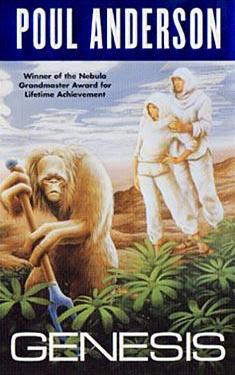GMRC Review: Genesis by Poul Anderson
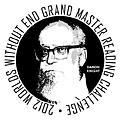 Guest Blogger, Allie McCarn, reviews science fiction and fantasy books on her blog Tethyan Books. She has contributed many great book reviews to WWEnd including several Grand Master reviews featured in our blog.
Guest Blogger, Allie McCarn, reviews science fiction and fantasy books on her blog Tethyan Books. She has contributed many great book reviews to WWEnd including several Grand Master reviews featured in our blog.
Genesis by Poul Anderson
Published: Tor, 2000
Awards Won: 2001 John W. Campbell Memorial Award
The Book:
“Imagine a future where humanity does make it to the stars, but must cease to be physically human in order to do so. The exploration can only be undertaken by machines, and by humans—such as astronaut Christian Brannock—who allow their consciousness to be uploaded into those machines. The universe of the far future is a web of machine consciousnesses, grown immensely powerful and complex, which communicate across the emptiness of space.
These consciousnesses still feel concern for their origin species—humanity—and their origin planet—Earth. When Earth’s AI, Gaia, decides to allow the planet to die, the others do not understand. There appear to be gaps in the data she is transmitting, either by accident or design. A smaller consciousness called Wayfarer, which contains the ancient astronaut Christian Brannock, is physically dispatched to Earth. Through closer examination of Gaia’s collective knowledge, he must try to understand her decision—or uncover her true motives.” ~Allie
This is my final novel for WWEnd’s Grand Master Reading Challenge, and my first experience of Anderson’s writing. Poul Anderson was a highly prolific and celebrated author, whose work spanned from the first Golden Age of science fiction to the beginning of the 21st century. I imagine his style must have changed greatly over the course of his life. I would be interested to see how Genesis, a novel from his later life, would compare to his earlier work.
GMRC Review: Ensign Flandry by Poul Anderson
 On his blog Stainless Steel Droppings blogger Carl V. Anderson reviews SF/F books and movies, conducts author interviews and even hosts his own reading challenge: The 2012 Science Fiction Experience. This is Carl’s sixth GMRC review to feature in our blog.
On his blog Stainless Steel Droppings blogger Carl V. Anderson reviews SF/F books and movies, conducts author interviews and even hosts his own reading challenge: The 2012 Science Fiction Experience. This is Carl’s sixth GMRC review to feature in our blog.
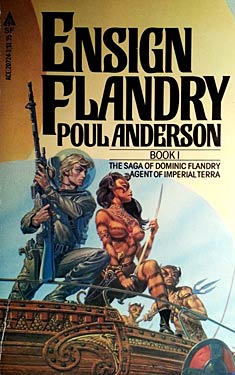 Poul Anderson is one of the authors I chose earlier this year as part of the Grand Master Reading Challenge hosted by Worlds Without End. Anderson was a prolific author whose career spanned many decades and consequently many eras of science fiction so I was unsure exactly where to start. I had toyed with the idea of starting with his Flandry series though the covers of the more recent collected editions tended to make me think these might be like the oversexed wish-fulfillment of Heinlein’s later years. I did not want that. When I saw this Michael Whelan cover for the first novel in the series my hopes rose and I decided to go ahead and snag the book for its cover, hoping that when I got around to reading it I would not be disappointed.
Poul Anderson is one of the authors I chose earlier this year as part of the Grand Master Reading Challenge hosted by Worlds Without End. Anderson was a prolific author whose career spanned many decades and consequently many eras of science fiction so I was unsure exactly where to start. I had toyed with the idea of starting with his Flandry series though the covers of the more recent collected editions tended to make me think these might be like the oversexed wish-fulfillment of Heinlein’s later years. I did not want that. When I saw this Michael Whelan cover for the first novel in the series my hopes rose and I decided to go ahead and snag the book for its cover, hoping that when I got around to reading it I would not be disappointed.
Guess what? I was not disappointed, not by a long shot.
My first foray into one of Poul Anderson’s created universes proved to be one filled with rip-roaring adventure, political intrigue, Bond-style romance and not a little bit of commentary on the soul-blackening compromise of world, or in this case Imperial, government. Ensign Flandry not only provided me with some of the everyman-hero-overcoming-all-odds storytelling I was hoping for but was also full of surprises.
GMRC Review: Tau Zero by Poul Anderson
 Daniel Roy (triseult), has contributed over 30 reviews to WWEnd including this, his third, for the GMRC. Daniel is living his dream of travelling the world and you can read about some of his adventures on his blog Mango Blue.
Daniel Roy (triseult), has contributed over 30 reviews to WWEnd including this, his third, for the GMRC. Daniel is living his dream of travelling the world and you can read about some of his adventures on his blog Mango Blue.
Tau Zero has been hailed as the quintessential hard SF novel, and it’s a well-deserved accolade. It shares some of the weaknesses of the genre, sure; but in its strengths it shines as an exceptional story, grounded in proper science, and brimming with mind-boggling ideas, hard science, and a scale rarely matched in SF.
Let’s get the weaknesses out of the way first. Yes, the character development is flimsy. And as with many other SF classics, it’s hard not to get irritated by its portrayal of women as fragile, irrational creatures. Most of the characters are interchangeable and forgettable, with the exception of Reymont, who turns into quite an interesting and complex character. The level of prose and character emotion can be summed up by the following two excerpts: the first, almost sensual, is a description of two space modules docking:
“[The ship’s] robots—sensor-computer-effector units—directing the terminal maneuvers caused airlocks to join in an exact kiss. More than that would be demanded of them later. Both chambers being exhausted, their outer valves swung back, enabling a plastic tube to make an airtight seal.”
The second describes a beautiful woman:
“Physically she was a big brunette, her features ordinary but the rest of her shown to high avantage by shorts and tee shirt.”
Oh, hard SF…
But anyway. Who reads hard SF for the character development and the prose? It’s all about the fascinating scientific concepts, and this novel has them in spades.
GMRC Review: Hrolf Kraki’s Saga by Poul Anderson
 Rhonda Knight is a frequent contributor to WWEnd through her many reviews and her excellent blog series Automata 101 and Outside the Norm. This is Rhonda’s seventh featured review for the Grand Master Reading Challenge. She won the GMRC Review of the Month for March for her review of The Word for World is Forest by Ursula K. Le Guin.
Rhonda Knight is a frequent contributor to WWEnd through her many reviews and her excellent blog series Automata 101 and Outside the Norm. This is Rhonda’s seventh featured review for the Grand Master Reading Challenge. She won the GMRC Review of the Month for March for her review of The Word for World is Forest by Ursula K. Le Guin.
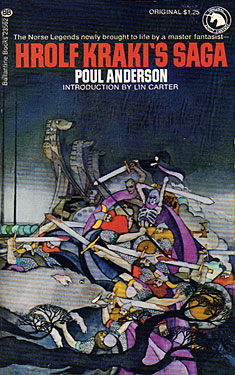 Poul Anderson‘s Hrolf Kraki’s Saga is a retelling of the Icelandic saga by the same name. Scholars believe the Icelandic saga was composed between the mid-eleventh and the mid-thirteenth centuries. Most of the Icelandic sagas written during this time record the history of the settlement of Iceland (beginning in the late 800s) or the rise of the first families of Iceland. Famous examples of such are Erik the Red’s Saga and Njal’s Saga. Hrolf’s is different from these family sagas, as they are usually called. It is a legendary saga, set in a long ago and far away Denmark. Scholars date the events occurring in Hrolf’s Saga to the late fifth and early sixth centuries. Interestingly, Hrolf’s ancestors, who figure prominently in the saga, are probably the same historical figures who appear in the Anglo-Saxon epic Beowulf. The Scylding clan found in Beowulf is called the Sköldings in Hrolf’s: the Hrolf figure is Hrothulf in Beowulf; his grandfather is Halfdan/Healfdane; his father is Helgi/Halga; and his uncle is Hroar/Hrothgar.
Poul Anderson‘s Hrolf Kraki’s Saga is a retelling of the Icelandic saga by the same name. Scholars believe the Icelandic saga was composed between the mid-eleventh and the mid-thirteenth centuries. Most of the Icelandic sagas written during this time record the history of the settlement of Iceland (beginning in the late 800s) or the rise of the first families of Iceland. Famous examples of such are Erik the Red’s Saga and Njal’s Saga. Hrolf’s is different from these family sagas, as they are usually called. It is a legendary saga, set in a long ago and far away Denmark. Scholars date the events occurring in Hrolf’s Saga to the late fifth and early sixth centuries. Interestingly, Hrolf’s ancestors, who figure prominently in the saga, are probably the same historical figures who appear in the Anglo-Saxon epic Beowulf. The Scylding clan found in Beowulf is called the Sköldings in Hrolf’s: the Hrolf figure is Hrothulf in Beowulf; his grandfather is Halfdan/Healfdane; his father is Helgi/Halga; and his uncle is Hroar/Hrothgar.
Anderson was, of course, aware of Hrolf’s origins and connections. With these in mind, he created a tale that stays very close to its origins, yet expands to encompass the saga’s connections to other legends and stories. Anderson incorporates bits from other sources, such as Saxo Grammaticus’s Gesta Danorum and Snorri Sturlusson’s Poetic Edda to fill in the saga’s gaps In constructing his tale, Anderson thinks about the multiple paths that this legend might have taken as an oral tale. Clearly, one of those paths led from Denmark through many countries and centuries until it reached medieval Iceland where it was written down, but there are multiple paths of transmission for any oral tale. In his intro, he writes:
GMRC Review: Tau Zero by Poul Anderson
 Guest Blogger and WWEnd member, valashain, reviews science fiction and fantasy books on his blog Val’s Random Comments which we featured in a previous post: Five SF/F Book Blogs Worth Reading. Val has posted many great reviews to WWEnd and this is his first for the GMRC. Be sure to visit his site and let him know you found him here.
Guest Blogger and WWEnd member, valashain, reviews science fiction and fantasy books on his blog Val’s Random Comments which we featured in a previous post: Five SF/F Book Blogs Worth Reading. Val has posted many great reviews to WWEnd and this is his first for the GMRC. Be sure to visit his site and let him know you found him here.
Note: There be spoilers here!
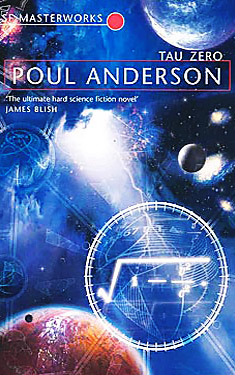 I decided to sign up for the 2012 Grand Master Reading Challenge, organized by World Without End. The goal is to read and review a work by a different Damon Knight Memorial Grand Master Award winner every month. I decided to start with Poul Anderson, who was honoured with the award in 1998. Tau Zero (1970) is one of his better known works. It was nominated for the Hugo Award in 1971 but lost to Larry Niven‘s Ringworld. It is a very good example of hard science fiction, written in a time when the direction of the genre was being drastically changed by the arrival of new age authors. The novel is an expansion of the short story To Outlive Eternity which was first published in Galaxy Science Fiction in 1967. I’m not going to hold back on spoilers in this review, the title of the short story gives is one already anyway. You have been warned.
I decided to sign up for the 2012 Grand Master Reading Challenge, organized by World Without End. The goal is to read and review a work by a different Damon Knight Memorial Grand Master Award winner every month. I decided to start with Poul Anderson, who was honoured with the award in 1998. Tau Zero (1970) is one of his better known works. It was nominated for the Hugo Award in 1971 but lost to Larry Niven‘s Ringworld. It is a very good example of hard science fiction, written in a time when the direction of the genre was being drastically changed by the arrival of new age authors. The novel is an expansion of the short story To Outlive Eternity which was first published in Galaxy Science Fiction in 1967. I’m not going to hold back on spoilers in this review, the title of the short story gives is one already anyway. You have been warned.
Fifty men and women are sent on the spaceship Leonora Christine to explore and, if possible, colonize a planet more than thirty light years away. To make the trip in a reasonable span of time, the spaceship has to approach the speed of light and make use of the time dilation effects that become appreciable at such speeds. Before deceleration can be set in, the engines needed to slow down the ship are severely damaged. Repairing them would mean shutting the acceleration engines off as well, which would result in a quick death from intense radiation. The ship’s speeds keeps increasing, hurling the crew ever faster through space and time. Unless they can find a way to slow down the crew is doomed to live out their life on board the space ship.
Tau Zero is science fiction so hard it cuts diamonds. A physics lesson and a novel rolled into one. The publisher kindly provided the formula for the time contraction factor Tau, which equals the square root of 1 minus v squared divided c squared, where v stand for velocity and the constant c is the speed of light. In other words Tau equals zero when v equals c (everybody still with me?). In a more practical sense, the closer the speed of the ship gets to the speed of light, the larger the difference between time passing for the crew and time passing outside the ship. I understand that Anderson’s use of Tau is a bit unorthodox but for narrative purposes it serves very well.
In a way, Anderson uses Tau to show us just how large the universe really is, something he is rather fond of doing in his other science fiction novels as well. As the velocity of the ship approaches the speed of light, minutes, hours, days, years and eventually aeons pass for every second of ship time. Galaxies are crossed, then clusters and super clusters to the point where time and distance becomes meaningless. In the end, Anderson takes us to the death of the universe itself and there a bit of speculation seeps in. The debate about the eventual fate of the universe is still raging, Anderson assumes the universe is cyclic and will eventually contract into a new singularity and expand again after a big bang. Although science has not come up with the proof for this yet, in literature the death and rebirth of the universe does make for a wonderful theme.
That’s quite a lot of physics and cosmology for the reader to take in. The more experience science fiction reader will have come across these elements before. Alastair Reynolds for instance, includes much more exotic science into his works. Anderson explains the physics clearly, even the more counter intuitive elements of relativity, but spares us quantum mechanics. Personally, I enjoyed the scientific passages a lot. That is my personal taste however; it will no doubt put some readers to sleep in a few pages. This novel requires some interest in physics and cosmology to really appreciate.
One might think that this would be enough science for a single novel but Anderson also throws in quite a lot of detail about the Bussard engine of the spaceship. This theoretical way of propelling a ship was first proposed in 1960 and has appeared in a number of science fiction novels by such authors as Larry Niven and Carl Sagan. It is basically a fusion engine which uses the minute quantities of free hydrogen in space to propel the ship. There has been a lot of debate about whether or not a ship powered in such a way would actually be able to reach relativistic speeds, but it’s an ingenious idea anyway. Again Anderson explains the design of the engine and its limitations, which play a large part in the efforts to slow the ship down, very clearly. I thought the engineering was a bit less interesting than the cosmology but it is central to the plot and Anderson makes sure not to overdo it.
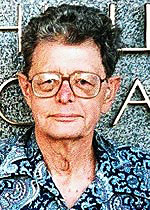 Hard science fiction has a reputation of paying less attention to character and character development. For Tau Zero that is definitely true. I guess you could consider the two people we meet in the opening chapter, the compassionate Ingrid Lindgren and the brusque Charles Reymont to be the main characters. They appear to be the people who keep the crew together and sane as Earth becomes an ever more distant memory. They are mostly people dealing with problems of the crew’s morale and organizing efforts to solve their technical problems. Although towards the end of the book things get a bit more philosophical (the death and rebirth theme does have an effect on them), there is very little in the way of development in their characters.
Hard science fiction has a reputation of paying less attention to character and character development. For Tau Zero that is definitely true. I guess you could consider the two people we meet in the opening chapter, the compassionate Ingrid Lindgren and the brusque Charles Reymont to be the main characters. They appear to be the people who keep the crew together and sane as Earth becomes an ever more distant memory. They are mostly people dealing with problems of the crew’s morale and organizing efforts to solve their technical problems. Although towards the end of the book things get a bit more philosophical (the death and rebirth theme does have an effect on them), there is very little in the way of development in their characters.
Most of the novel is set in space so the future history of Earth is not all that important. We do get a glimpse of a society where Sweden has become the centre of power in the world after a nuclear war that almost doomed the planet. IKEA everywhere, surely this must count as a dystopia. Anderson, American of Danish descent, also weaves in some reverences to Scandinavian mythology, something that returns in many of his novel. It’s a bit of an odd contrast really, the cyclic nature of the universe as described in this novel, reminded me more of Hindu mythology.
According to the blurb on the cover, James Blish considers this book the ultimate hard science fiction novel. There is something to be said for that. I have rarely read a novel with such rigorous scientific underpinnings. Anderson had a degree in physics and in other novels it is quite clear that he thought about the properties of fictional planets he created. In Tau Zero he takes it way beyond that and makes physics the main character. The scope of the novel, in time and space is almost beyond comprehension (something the author points out several times in the text). Anderson takes hard science fiction as far as it will go; in that sense it is the ultimate novel in this particular sub-genre. That being said, it does not escape the shortcomings generally associated with the sub-genre. I’d say it is a must read for fans of hard science fiction only.



















 Full Details
Full Details
